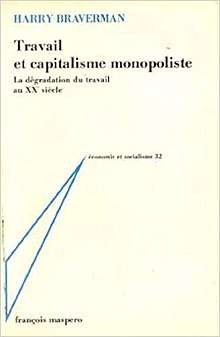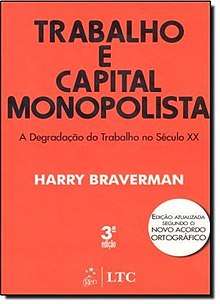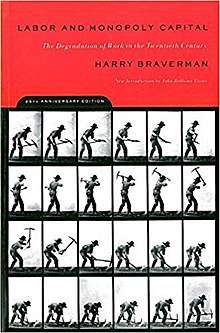Labor and Monopoly Capital
_cover.jpg) Cover of the 1974 edition | |
| Authors | Harry Braverman |
|---|---|
| Country | United States |
| Language | English |
| Subject | Labor |
| Published | 1974 (Monthly Review Press) |
| Media type | |
Labor and Monopoly Capital: The Degradation of Work in the Twentieth Century is a book by Harry Braverman on the economics and sociology of work under monopoly capitalism. Building on Monopoly Capital by Paul A. Baran and Paul Sweezy, it was first published in 1974 by Monthly Review Press.[1][2]
Arguments
Intended as a direct assault on management of blue-collar labor under capitalism, Braverman's book started what came to be called, using Braverman's phraseology, "the labor process debate".[3] This had as its focus a close examination the nature of "skill" and the finding that there was a decline in the use of skilled labor as a result of managerial strategies of workplace control. It also outlined workers' resistance to such managerial strategies.[4]
Braverman argued that knowledge of Taylorism's profound impact on the twentieth century workplace, and management-labor relations, was poor due to a widespread misunderstanding of the historical development of the workplace. Indeed, Braverman's book was written in an accessible fashion precisely to make it easy for workers to comprehend the huge historical and structural changes which had taken place around them.[5]
According to Braverman, Taylorism had not been superseded by more humanistic management methods, such as those of Hugo Münsterberg or Elton Mayo (as most textbooks then argued). Braverman instead argued that these 'practitioners of "human relations" and "industrial psychology"' have supplemented Taylor's influence by forming 'the maintenance crew for the human machinery'.[1]
Braverman subjected Taylor to intense critique, describing Taylor's strident pronouncements on management's attitudes to workers as the "explicit verbalization of the capitalist mode of production". He argued that, in the present day, the 'successors to Taylor are to be found in engineering and work design, and in top management'.[1]



Key thinkers
Labor and Monopoly Capital built on influential historians such as E.P. Thompson, Alfred Chandler, J.D. Bernal, David Landes, Lyndall Urwick, and E.F.L. Brech. In particular, Urwick was attacked as the 'rhapsodic historian of the scientific management movement'.[1]
Key thinkers examined in Labor and Monopoly Capital were Karl Marx, Charles Babbage, Vladimir Lenin, F. W. Taylor, Frank Gilbreth, William Leffingwell, Elton Mayo, and Lyndall Urwick.
Sociological analysis was provided by such authors as Paul Sweezy, Paul A. Baran, Georges Friedmann, William Foote Whyte, and Daniel Bell.
Impact
According to one source, the book sold 120,000 copies between 1974 and its 1999 reissue.[6]
Labor and Monopoly Capital was read widely in many languages and had particular impact on scholarly debate in Britain, to the extent that one author described the phenomenon as 'Bravermania'.[7].
Historical studies influenced by Labor and Monopoly Capital include research into deskilling, bureaucracy, Marxist historiography, business history, historical sociology, the Bedaux System, Bedaux Unit, and the Taylor Society.
Despite being overtly hostile to academic sociology,[8] Labor and Monopoly Capital became one of the most important sociological books of its era. It revived academic interest in both the history and the sociology of workplaces setting the agenda for many subsequent historians and sociologists of the workplace.
Like Baran and Sweezy's Monopoly Capital, Braverman's book made a comeback during the Great Recession and debates on Taylorism 2.0.[9][10][11]
See also
References
- 1 2 3 4 Braverman, Harry (January 1998). Labor and Monopoly Capital: The Degradation of Work in the Twentieth Century. New York: Monthly Review Press. ISBN 0-85345-940-1.
- ↑ https://monthlyreview.org/product/labor_and_monopoly_capital/
- ↑ Littler, Craig R., 'The Labour Process Debate: A Theoretical Review, 1974-88' in David Knights, and Hugh Willmott (eds.), Labour Process Theory (Basingstoke and London: Macmillan Press, 1990).
- ↑ Meiksins, P. (1994). "Labor and Monopoly Capital for the 1990s: A Review and Critique of the Labor Process Debate". Monthly Review. 46 (6): 45–59. doi:10.14452/MR-046-06-1994-10_4.
- ↑ https://books.google.co.uk/books/about/Labor_and_monopoly_capital.html?id=YEocaPj7PtUC
- ↑ "Harry Braverman". www.Marxists.org. Retrieved August 17, 2017.
- ↑ Littler, Craig R., and Graeme Salaman. "Bravermania and beyond: recent theories of the labour process." Sociology 16.2 (1982): 251-269.
- ↑ On pp. 96–97, Braverman remarks that 'The cardinal feature of these various schools and the currents within them is that, unlike the scientific management movement, they do not by and large concern themselves with the organization of work, but rather with the conditions under which the worker may best be brought to cooperate in the scheme of work organized by the industrial engineer ... Most orthodox social scientists adhere firmly, indeed desperately, to the dictum that their task is not the study of the objective conditions of work, but only of the subjective phenomena to which these give rise: the degrees of "satisfaction" and "dissatisfaction" elicited by their questionnaires.'
- ↑ https://monthlyreview.org/2014/10/01/beyond-the-degradation-of-labor/#en1
- ↑ http://blackeducator.blogspot.com/2014/06/taylorism-20-transforming-teachers-into.html
- ↑ Return of 'Taylorism' on steroids, Financial Times, 8 September 2016: https://www.ft.com/content/12f85bc3-5816-48f6-88f6-7f64fdd99af8
Further reading
- Braverman, Harry. 'Two comments.' Monthly Review 28.3 (1976): 122-23.
- Littler, Craig R. The development of the labour process in capitalist societies: a comparative study of the transformation of work organization in Britain, Japan, and the USA. Heinemann Educational Publishers, 1982.
- Littler, Craig R., and Graeme Salaman. "Bravermania and beyond: recent theories of the labour process." Sociology 16.2 (1982): 251-269.
- Arlie Russell Hochschild. The Managed Heart: Commercialization of Human Feeling (1983).
- Bryan D. Palmer, “Before Braverman: Harry Frankel and the American Workers’ Movement,” Monthly Review 50, no. 8 (1999): 33